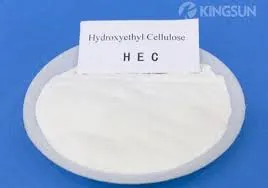
Nov . 11, 2024 18:26 Back to list
hydroxyethyl cellulose for sale
The Versatile Applications of Hydroxyethyl Cellulose A Look at Its Availability and Uses
Hydroxyethyl cellulose (HEC) is a non-ionic, water-soluble polymer derived from cellulose, a natural substance sourced from plant cell walls. This versatile compound has garnered significant attention across various industries due to its unique properties, including thickening, gelling, and film-forming abilities. With a growing demand for HEC in different applications, there is an increasing availability of hydroxyethyl cellulose for sale in the market.
Chemical Properties and Characteristics
HEC is produced by the etherification of cellulose, which allows it to absorb large amounts of water, leading to an increase in viscosity. This property is particularly beneficial in various formulations, be it in cosmetics, pharmaceuticals, or industrial applications. HEC is known for its excellent stability across a range of pH levels and temperatures, making it a suitable choice for diverse environments. Additionally, it is biocompatible and biodegradable, which aligns with the growing consumer demand for sustainable and eco-friendly products.
Applications in Cosmetics and Personal Care
One of the primary industries utilizing hydroxyethyl cellulose is cosmetics and personal care. It is used as a thickener in shampoos, conditioners, lotions, and creams due to its ability to enhance texture and stability. HEC helps improve the spreadability of products, ensuring a smooth application on the skin. Moreover, its ability to form a film allows for the controlled release of active ingredients, making it an asset in skincare formulations designed for long-lasting effects. The clean, non-greasy feel HEC provides makes it popular among both manufacturers and consumers.
Use in Pharmaceuticals
In the pharmaceutical industry, hydroxyethyl cellulose plays a crucial role as a viscosity enhancer and binder in tablets and capsules. Its water-soluble nature ensures that medications can dissolve effectively in the body, facilitating better absorption of active ingredients. HEC is also utilized in ophthalmic solutions and gels due to its non-toxicity and compatibility with sensitive tissues. These attributes make it a sought-after ingredient in many formulations aimed at addressing specific health concerns.
hydroxyethyl cellulose for sale

Industrial Applications
Beyond its use in personal care and pharmaceuticals, hydroxyethyl cellulose finds applications in the construction and paint industries. It serves as a thickener for adhesives, coatings, and sealants, improving their performance and ease of application. In this context, HEC contributes to the workability and stability of products, allowing for enhanced adhesion and coverage. Its ability to maintain viscosity even under shear stress is particularly beneficial during the application of paint and coatings, ensuring a smooth finish.
Availability of Hydroxyethyl Cellulose
As the demand for hydroxyethyl cellulose continues to rise, suppliers are responding by providing diverse options for businesses looking to integrate this polymer into their formulations. Various grades of HEC are available, tailored for specific applications and performance requirements. Buyers can source hydroxyethyl cellulose from both local and international suppliers, often in bulk quantities, making it accessible for manufacturers of all sizes.
With the pharmaceutical, cosmetic, and industrial sectors continuing to evolve, the market for hydroxyethyl cellulose is expected to expand further. Companies are increasingly recognizing the advantages of using HEC as a functional ingredient, which not only enhances product performance but also aligns with consumer demands for sustainability and safety.
Conclusion
Hydroxyethyl cellulose is more than just a thickener; its multifunctional properties make it a valuable ingredient across various industries. As it becomes more widely available for sale, manufacturers are harnessing its potential to improve product formulations and meet consumer needs. Whether used in skincare, pharmaceuticals, or industrial applications, HEC is a testament to the innovative uses of natural polymers in modern products. As we move forward, the continued exploration of its benefits will likely lead to even more exciting applications in the future.
-
Versatile Hpmc Uses in Different Industries
NewsJun.19,2025
-
Redispersible Powder's Role in Enhancing Durability of Construction Products
NewsJun.19,2025
-
Hydroxyethyl Cellulose Applications Driving Green Industrial Processes
NewsJun.19,2025
-
Exploring Different Redispersible Polymer Powder
NewsJun.19,2025
-
Choosing the Right Mortar Bonding Agent
NewsJun.19,2025
-
Applications and Significance of China Hpmc in Modern Industries
NewsJun.19,2025







